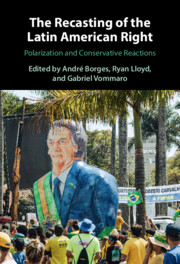Book contents
- The Recasting of the Latin American Right
- The Recasting of the Latin American Right
- Copyright page
- Contents
- Figures
- Tables
- Contributors
- Introduction
- Part I Building Right-Wing Parties and Partisans
- Part II A New Right? Ideational and Programmatic Change after the Left Turn
- 6 Progressive Policy Change, Cultural Backlash, and Party Polarization in Latin America
- 7 The Latin American Populist Radical Right in Comparative Perspective
- 8 Between Gattopardismo and Ideational Change
- 9 Whose Right, Whose Left? Analyzing the Complexities of Right-Wing Politics in Venezuela
- 10 A Conversion to the Right
- Conclusions
- References
- Index
10 - A Conversion to the Right
The Case of the 2018 Election of Jair Bolsonaro in Brazil
from Part II - A New Right? Ideational and Programmatic Change after the Left Turn
Published online by Cambridge University Press: 29 November 2024
- The Recasting of the Latin American Right
- The Recasting of the Latin American Right
- Copyright page
- Contents
- Figures
- Tables
- Contributors
- Introduction
- Part I Building Right-Wing Parties and Partisans
- Part II A New Right? Ideational and Programmatic Change after the Left Turn
- 6 Progressive Policy Change, Cultural Backlash, and Party Polarization in Latin America
- 7 The Latin American Populist Radical Right in Comparative Perspective
- 8 Between Gattopardismo and Ideational Change
- 9 Whose Right, Whose Left? Analyzing the Complexities of Right-Wing Politics in Venezuela
- 10 A Conversion to the Right
- Conclusions
- References
- Index
Summary
This chapter examines how religious transformations in Latin America over the past few decades have influenced the rise of the right. Analyzing a five-wave panel study from the “Democracy on the Ballot” project, the authors show that Bolsonaro won much of his support from evangelicals and Pentecostals during the final month of the campaign. While they find little support for the notion that attending church or discussing politics there influenced vote choice, church leaders’ endorsements of Bolsonaro did in fact matter. Other relevant factors included attitudes on the importance of religion in one’s own life, one’s approval of church engagement in elections, anti-LGBT attitudes, and authoritarian parenting values.
Keywords
- Type
- Chapter
- Information
- The Recasting of the Latin American RightPolarization and Conservative Reactions, pp. 219 - 236Publisher: Cambridge University PressPrint publication year: 2024

